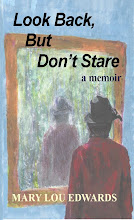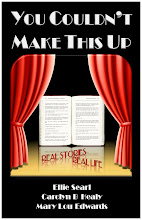Life has to be hard. Not life was hard or life is hard or life can be hard. No, life has to be hard. This was my father's mantra.
 Experiencing the Great Depression as a teen-ager, he observed the travails of the jobless. Land mines of economic destruction and desperation exploded around him, wounding not only his sense of personal dignity and self-worth, but also scarring those who would later share his life. The Depression, the economic vulnerability, were proof that God wanted life to be hard--its psychic imprint served as a constant reminder of His wrath.
Experiencing the Great Depression as a teen-ager, he observed the travails of the jobless. Land mines of economic destruction and desperation exploded around him, wounding not only his sense of personal dignity and self-worth, but also scarring those who would later share his life. The Depression, the economic vulnerability, were proof that God wanted life to be hard--its psychic imprint served as a constant reminder of His wrath.From 1932 forward, good, beauty and accomplishment were viewed through astigmatic eyes that did not allow the celebration of life’s gifts or achievements. Hard work was the protectant; enjoyment the enemy.
He acknowledged God’s gifts, but dared not savor them because life had to be a struggle and the Great Scorekeeper kept a sharp eye out for those who searched for the easy way. A God who deprived the undeserving, punished the ungrateful and exacted a price from those who didn’t use their gifts correctly was not to be crossed. And because some people were not listening, despite Matthew, Mark, Luke and John having spread The Word, He deputized Jim, and Jim, my father, became God’s translator.
In the deaf community, there is a huge debate about the responsibilities of the translator. Does the translator relay the exact message of the deaf or a sanitized version? Does the translator communicate only the literal or tinker with intent, and, beyond that, does the translator interject what he thinks the deaf person really meant to say? In my father's world, we were all pathetic scofflaws, and in the colloquial sense, deaf and dumb too.
Dad interpreted what God meant—what God intended—what God wanted. In fact, his pipeline was so direct, he understood what God demanded even before God knew, and, because the Deity was preoccupied with wreaking economic havoc around the world and sorting through the wreckage, dad, familiar with the drill, filled the vacuum. Whether a trifling matter or major issue, he never strayed from the message—life has to be hard.
One didn’t really know how to drive unless the car was stick shift nor eat a genuine sandwich unless the bread was homemade. A four inch footing was insufficient for a proper concrete patio, a three foot pit had to be dug. A week's vacation involved mending broken screen doors, fixing appliances that were on their last legs and repairing squeaky floor boards in a rented summer cottage. Picnics required homebaked cakes and hauling 4 course meals a mile, under scorching sun and over burning sand, down to the beach. The inside of a refinished dresser drawer had to be as flawless as the top. And all because, in order to grow, in order to really live, life had to be hard. The tougher it was, the better one was, the closer one came to earning life’s gifts and God’s approval.
Swimming, biking, ice skating, chess were not pastimes; they were skills to be perfected through effort and practice. Hobbies were a waste of time unless one intended to incorporate them into a career.
College students, according to dad’s Gospel, needed to study two hours a night for each scheduled credit hour. In response to his constant badgering that I was a bogus scholar, who really didn’t value, care about, want, appreciate or all of the above, an education, I attempted to reason with him.
“Dad,” I tried to explain, “I carry 16 hours a semester. I’d have to study 32 hours a night.”
“Do you think they’re just going to hand you a diploma? Do you think life is a cakewalk?” he thundered. “There is no easy way out!”
How silly of me to think good grades indicated sufficient study when only blood, sweat and tears could provide real validation. How stupid of me to forget life had to be a bitch.
When life got too good, as sometimes happened, Dad would temper it with shame. Shame was the antidote to toxic enjoyment. Shame was the “go to” emotion that ensured one never forgot that life had to be hard.
As a kid, my brother was quite a good baseball player. He did not brag about it, but he made the fatal mistake of being comfortable with his competence, of knowing he had skill and talent, of believing in himself. Life was good for a 12 year-old gifted athlete--maybe too good. He needed to be cut down to size. He had to pay for his imagined adolescent cockiness. He needed to know that life was hard and, if he was not getting the message, then God would teach him and the great translator would deliver the news.
Once during a ballgame, my brother knocked the winning run out of the park. Thrilled with his accomplishment, he sauntered around the bases basking in the admiration of the crowd. My father was incensed and awaited him at home plate. Yanking my brother by the shirt, he shouted, “Who do you think you are? You need to hustle, move your ass around that field—run like you mean it!”
One can only imagine the embarrassment and humiliation my brother felt at being criticized and ridiculed in front of the crowd. But God wasn’t finished--sometimes life had to be extra hard.
Grabbing my brother by the uniform, God dragged him over to the coach. “Don’t count that run in the score,” He ordered. That homerun doesn’t count. The kid didn’t earn it, he doesn’t appreciate it,” He bellowed. “Take it off the board!”
Suddenly it was no longer about the winning homerun. It was about God running amok.
The boys on the team crowded around stunned. The spectators watched in amazement as though they could not believe their ears. The coach, astounded at the outrageous request, glared in disbelief. My mother stood frozen by God’s rage.
Actually, it was all my brother’s fault for forgetting that life had to be hard. God had no choice but to teach him a lesson he’d never forget, had no choice but to etch that reminder on his young psyche.
Dad continued to carry the message everywhere and never missed an opportunity to educate us about life’s trials. No event was too trivial or grand to ruin--one really didn’t deserve to be on the honor roll, dinner time was for eating not chattering, proms were nonsense, getting a degree from a world-class institution was a fluke and a great job was yours only because the employer had yet to find you out.
But as I grew, I started to question my father's "no matter what you do it's never good enough and you must always work harder" ethic. Despite his thinking we kids hadn't worked hard enough for the honor roll, we consistently made it so it couldn't have been by chance. Some slackers probably made it through the University of Illinois, but most degrees were hard won. Could it be that human beings weren't supposed to be perfect?
And then I heard about Louie Aparicio hitting a homerun and swaggering around the bases at a White Sox game. Perhaps life didn't have to be hard. Perhaps life is only as hard as you make it.
MLSE 06/09






